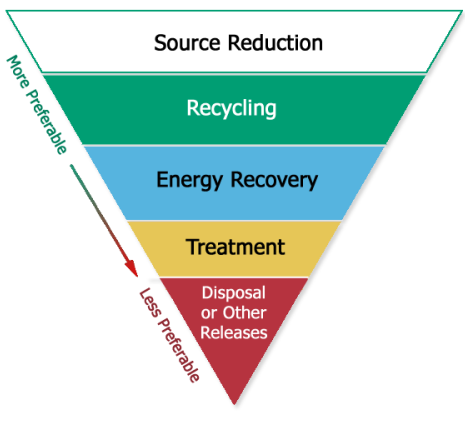Production Related Waste Management for Selected Chemical
lchemid=0007782505
Waste Management Comparison - 2022
Pollution Prevention Activities for Selected Chemical
| Reporting Year | Section 8.10: Newly Implemented Source Reduction Activity | Section 8.10: Methods to Identify Activity | Section 8.11: Optional Pollution Prevention Information* |
|---|---|---|---|
| 2019 |
Source Reduction: Source Reduction - We removed chlorine gas as treatment method on 11/19/2019 |
||
| 2018 |
Barriers: B3-Barriers to P2 B3 - Concern that product quality may decline as a result of source reduction.
|
Barriers to P2: B3 - Concern that product quality may decline as a result of source reduction. - We use chlorine for biological control in our process water loops so lowering the concentration will have a food quality impact. |
|
| 2016 |
Barriers: B1-Barriers to P2 B1 - Insufficient capital to install new source reduction equipment or implement new source reduction activities/initiat
|
Barriers to P2: B1 - Insufficient capital to install new source reduction equipment or implement new source reduction activities/initiat - The chemical is used as a processing aide to maintain water quality. The only viable replace option is capital constrained due to the economic evaluation of cost to operate over the life of the process. |
|
| 2015 |
Source Reduction:: W13: Improved maintenance scheduling, recordkeeping, or procedures
|
Methods to Identify SR Opportunities: T01: Internal pollution prevention opportunity audit(s)
|
Source Reduction - Reviewed onsite procedures and use of chemical which help use at historical values |
| 2014 |
Other Barriers to Source Reduction - The chemical is used for bacteria control only. We are looking at other chemical alternatives which will alteviate the regulatory reporting burden. |
||
| 2013 |
Other Barriers to Source Reduction - Other viable biological water control strategies are currently being reviewed. The cost of these alternatives have been cost prohibitive when compare to the current COI. |
TRI Pollution Prevention Glossary
The Waste Management Hierarchy |
The waste management hierarchy established by the Pollution Prevention Act (PPA) guides waste generators toward the best options for managing wastes.
The preferred option is to prevent pollution at its source, but for waste that is generated, the preferred management methods are recycling, followed
by burning for energy recovery, treatment and, as a last resort, disposing of the waste.
|
- A breakdown of production-related waste managed. This includes all amounts of the chemical released directly to the environment or otherwise managed as waste, other than waste generated by one-time events not associated with normal production processes (e.g., fires or remedial actions).
- A production ratio or activity index to provide context for reported toxic chemical quantities. For example, if a chemical is used in the manufacture of refrigerators, the production index would track the number of refrigerators produced and could be used to help gauge how much of the chemical is being released per unit of production.
- Any newly implemented source reduction activities, reported using "W-codes" (e.g., "W41: Increased purity of raw materials")